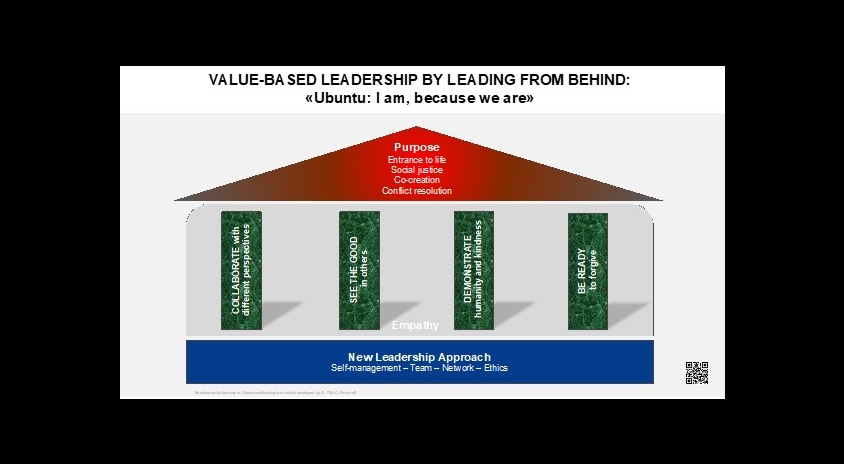
Introduction
What exactly is Ubuntu, and can its philosophy develop new leadership that is able to impact postmodern management models? The following three statements summarize principles, and why it is worth considering:
“The spirit of Ubuntu - that profound African sense that we are human only through the humanity of other human beings - is not a parochial phenomenon but has added globally to our common search for a better world”, postulated the late President Nelson R. Mandela, at his Oxford University lecture on July 11, 1997.
For Archbishop Emeritus Desmond Tutu, the meaning of Ubuntu and how it defines us as a society, runs as follows: “We think of ourselves far too frequently as just individuals, separated from one another, whereas you are connected and what you do affects the whole world,” he said. “When you do well, it spreads out; it is for the whole of humanity".
Former US President Barack Obama outlined in his speech at Nelson R. Mandela’s funeral on December 10, 2013 that “there is a word in South Africa - Ubuntu - a word that captures Mandela's greatest gift: his recognition that we are all bound together in ways that are invisible to the eye; that there is a oneness to humanity; that we achieve ourselves by sharing ourselves with others, and caring for those around us”.
In the following, I would like to share my experiences, discussions and reflections based upon a learning journey that I undertook, following Nelson R. Mandela’s walk to freedom in South Africa. As it is common knowledge that “everyone can develop Ubuntu further”, I present a comprehensive new leadership framework (Exhibit 1) that is based upon Ubuntu. It considers a value-based driven leadership approach.
Exhibit 1: Framework for new leadership and core value pillars

Value-based leadership and purpose
It is argued that a new leadership paradigm for politics and business should be based upon distinctive purpose and values, in order to navigate and thrive in an uncertain, volatile environment and times. The leadership model has four cornerstones as its basis. They are:
- Entrance to life
- Social justice
- Co-creation
- Conflict resolution
The first factor, the “entrance to life” represents the key of this model, and in a sense is also the pre-requisite thereof. This is because “entrance to life” enables a well-balanced leadership approach; in understanding one’s own drivers for happiness, wellbeing, and well-feeling, one can become a balanced leader that is in harmony with oneself. In other words, you are in sync with yourself.
The further basis of this framework is social justice, which brings to the forefront “doing well by doing good” as the key. For, social justice propagates the furthering of others. Co-creation, innovation and teamwork drives the management agenda, projects, and initiatives. What is more, conflicts in teams may arise through close collaboration, and need to be addressed. The incorporation of a conflict resolution approach, where common understanding and consensus represents the best alternative for finding solutions, is suggested. Debate is encouraged, firstly to benefit from the contribution and participation of team members, secondly, to achieve a successful consensus and thirdly, to foster teamwork and sense of belonging to a family or community.
Core value pillars
Core values define what is important to uphold in an environment and in an interaction with others, and more broadly, how to collaborate amongst each other in politics, business, and society. From an Ubuntu perspective, I purport four core values that must be integrated in a purposeful leadership approach.
- Collaborate with different perspectives
- See the good in others
- Demonstrate humanity and kindness
- Be ready to forgive
Over and over again, one can observe the fact, which feels like common knowledge, that a team performs better than an individual. If ever, I suggest trying the use case known as “how to survive”, which shows the difference between taking a group or an individual decision. This means that it can be eye-opening to collaborate with different perspectives, as it can open new worlds and give another glimpse to assess a situation, that one may not have considered individually. In this vein, different perspectives might open up new angles and insights that can trigger innovative solutions. The second pillar, namely seeing the good in others, may allow individuals to open new doors and thereby to enter and take new paths that were previously unseen. What is further suggested is demonstrating humanity and kindness by working and living together. It also means evaluate the impact of one’s decision and behaviour on others; it creates connections among teammates and encourage a sense of belonging to a unique community. Last but not least, being ready to forgive leads to the path for healing ourselves and our world. It is important to reflect for oneself what values are important, and what might be missing in today’s work.
The fundamental aspect which is underpinning these four core pillars is empathy: empathy allows for a collaborative approach, as it gives an understanding of the others; it leads you to seeing the good in others; it pushes you to demonstrate humanity and kindness; and essentially, it gives you the toolbox to be ready to forgive. Empathy means not only an understanding of core values, but also the core values of others, and how these impact each individuals’ relational behaviour with others and with the environment. Oftentimes, being able to understand another’s core values and the way they interact with the world can allow a different, collaborative approach, where empathetic behaviour drives a common mindset and direction. Empathy is the fabric, the DNA of a team to collaborate, and for a leader, defines the value-based leadership approach. In short: Empathy is “we are, not I am”.
New leadership approach
Nelson R. Mandela once said: “A leader is like a shepherd. He stays behind the flock, letting most nimble go out ahead, whereupon the others follow, not realizing that all along they are being directed from behind”.
In their book “Being the Boss” three imperatives for success, namely manage yourself, your team and network are postulated by Linda A. Hill and Kent Lineback. Indeed, they were also influenced by Mandela’s leadership qualities. In the following, I allude to these three and add a fourth one: Ethical management and trust.
In summary, leading from behind is based upon the four imperatives:
- Self-management, i.e. it starts with oneself to change and transform
- Team management and development
- Network / relationship management
- Ethical management and trust
First and foremost, self-management is more important than ever. One should take up a self-responsibility to highlight issues, and take own initiatives to change and transform. Of course, working in a team enhances and opens new perspectives to grow and develop. The motto: “One team, one direction” has the potential to change mountains. It is not what you know, but who you know. Hence network and relationship management are a must for a balanced, well rounded, and connected leader. In times of fraud and lack of corporate governance ethos, ethical management based on trust is the means to its end, for having a sound moral behaviour.
Political and business context
A new leadership paradigm shift is needed to manage successfully in uncertain and volatile times. It is not about this or that, black or white, in or out, it is about not only, but also, and including as well as. In other words, to find common ground, consensus, or synthesis. The “common” should unite. Ergo, “I am, because we are”.
To apply Ubuntu for management, it is suggested to develop and co-create new ventures, projects and activities in teams or organizations across borders: No silos management, but openness to collaborate and share. What is more, it is to create win-win situations where conflict resolutions are part of the way forward and upwards.
Conclusion
Leading from behind and having a value-based leadership approach, philosophy and framework that considers all actors and stakeholders offers great potential for a profound management impact. It is integrative, open, and based on “we” not me (Ubuntu). In times in which it is oftentimes easier to focus on differences and be on extreme ends of the spectrum, as starkly divided as being either left or right, black or white, in or out, it has the potential to integrate one another, focus on common points, further understanding, and thus unite instead of divide.
Going forward, this is more important than ever in this fragile globalized world. Everybody can make a change and contribution. Are you ready with your mind, heart, and soul to transition to new leadership framework based on purpose and values?
NB
Ubuntu has an additional edge as it is among the world's most popular versions of Linux, the open-source operating system. It claims some 200 million users worldwide.
My thanks go to Warwick Business School Fellow Alumni Heinrich C. Volmink for his Ubuntu input and empathy as a core value pillar.
References and sources
Hill Linda A. and Lineback Ken (2019), Being the boss: The 3 imperatives for becoming a great leader, Harvard Business Review Press
Mandela Nelson R. (1995), Long walk to freedom: The autobiography of Nelson Mandela, Times Warner Book UK
Molzbichler Daniela and Sturmer Martin (2022), Ubuntu – Mandela für Führungskräfte: Anregungen für Selbstmanagement, Teamarbeit und Konfliktlösung, Essentials, Springer Gabler
Nussbaum Barbara (2003), African culture and Ubuntu, Reflections of a South Africa in America, World Business Academy
Tutu Desmond and Tutu Mpho (2014), The book of forgiving: The four fold path for healing ourselves and our world, Haper Collins and Haper One
Volmink Heinrich C. (2010), Ubuntu from Concept to Practice: Gleaning Lessons for Global Citizenship and Governance, Dissertation MPA, University of Warwick, February
Volmink John D. (2019), Ubuntu: Philosophy of life and social ethics, Building bridges - Ubuntu and servant leadership, ImPress
Fellow Institut für Management (IfM) Alumni discussions (2023) on Ubuntu learning journey in South Africa. Kevin Chaplin, Wenwei Holzrattner, Gordon und Maria Hrgota, Franz Knauseder, Mag. Martin Meischl, Josef Mickl, Thomas und Antje Moucka, Dr. Rosemarie Plötzeneder, Markus Stainer, Dr. Martin Sturmer, Dr. Wolfgang Reiger plus Vusi Peace Mnisi
Author: Dr. Otto C. Frommelt, MBA is Director at the National Road Office of the Principality of Liechtenstein. He has extensive international Senior Management expertise including board assignments. Multilingual with commercial sales, marketing, finance and leadership skills within automotive industry, non-profit organizations, public administration and innovative start-ups (Technology, Blockchain, Energy, Health sector, etc.). Currently he is a Governing Board Member at the Conference of European Directors of Roads (CEDR) as well as Member of Cardossier Association to manage the vehicle life cycle with blockchain technology. He is also a Business Angel, Blockchain Advisor, Keynote Speaker, international Scenario / Strategy Expert, Author and Mentor.
More information: https://ottocfrommelt.li

